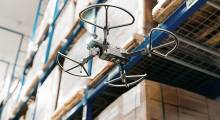Enrico Krog Iversen, former CEO of Universal Robots, along with the Danish Growth Fund have announced the merger of three end-of-arm tooling companies to facilitate the ongoing growth of collaborative robotics, an industry expected to reach $8.5 billion by 2025.
The new company combines U.S.-based Perception Robotics, Hungary-based OptoForce, and Denmark-based On Robot to become OnRobot, which will drive innovation and ease-of-use for robotic end-of-arm tooling. OnRobot’s headquarters will be located in Denmark under Iversen’s management, and the three entities will continue their individual operations and development as well. In addition, OnRobot’s global network of distributors will have access to local sales support, technical assistance and product training from the company’s regional offices in Germany, China, U.S., Malaysia, and Hungary, with more offices to come in 2018.
“The aim is to build a world-leading organization in development and production of end-of-arm tooling,” Iversen said. “Through further acquisitions and collaborations, we expect to reach a revenue exceeding one hundred million dollars in a few years. Safe, cost-effective and versatile cobots are becoming increasingly common because they offer sophisticated and intuitive programming that enables them to be easily deployed and redeployed. Easy-to-integrate end-of-arm tooling, such as grippers and sensors, become vital elements in adapting these powerful automation tools for a wide range of applications.”
In 2015, Iversen and the Danish Growth Fund sold the Danish cobot company Universal Robots to U.S.-based Teradyne for $285 million. With their new venture, the two investors now further strengthen Denmark’s global position in the robotics field.
“In recent years Denmark has successfully established itself as a global hub for robotic technologies,” said Christian Motzfeldt, CEO of the Danish Growth Fund. “Universal Robots was a pioneer, and since then, many more strong and innovative companies have been formed with roots in Odense, Denmark. The new OnRobot has the potential to become not only a world-leading company, but also a catalyst for further development of the Danish robotics cluster. We are pleased to promote this trend through our investments and invite both companies and investors from around the world to come join us.”
Collaborative robots, which work safely alongside humans in applications such as packaging, quality testing, material handling, machine tending, assembly and welding, currently represent 3% of global robot sales, according to the International Federation of Robotics, but the share is expected to rise to 34% of a $25 billion market by 2025.
“This growth will most definitely depend on cobots being used in more applications,” Iversen added. “Their small footprint and ability to work safely alongside humans make them ideal for small and medium-sized manufacturers who need to compete globally. Cobots are also increasingly integrated into very large manufacturers such as automotive plants, where they are taking over processes that can’t be automated using traditional robotics. As the types of cobot applications expand, so does the need for new tooling that can be quickly and easily integrated into the cobot’s user interface. The new OnRobot is championing a current mega trend in the field of automation. Combining the unique capabilities of these end-of-arm technologies under one umbrella company that is led by some of the smartest minds in the robotics industry will make them even easier to implement and program. By the way, the new OnRobot is currently looking to add employees in R&D.”
Companies Chosen for Synergies, Ease of Integration, Vision
The three companies that will form the new OnRobot were chosen because of their synergistic end-of-arm technologies, the ability of these technologies to easily integrate to provide improved support and the long-term vision and capabilities of each company’s founders.
● On Robot, founded in 2015,provides plug-and-play electric grippers — RG2 and RG6 — that mount directly on the robot arm, are highly flexible and are simple enough to be programmed and operated from the same interface as the robot without the need of engineers.
● OptoForce, founded in 2012, provides force/torque sensors that bring the sense of touch to industrial robots so that they can automate tasks that would otherwise require the dexterity of the human hand.
● Perception Robotics, founded in 2012 and based in Los Angeles, develops bio-inspired robot grippers: 1) a gecko-inspired gripper for handling large, flat objects and 2) a tactile gripper with compliant rubber tactile sensors (“skin”) to give robots a sense of touch. Its first grippers will be available this year.
Article topics
Email Sign Up


















